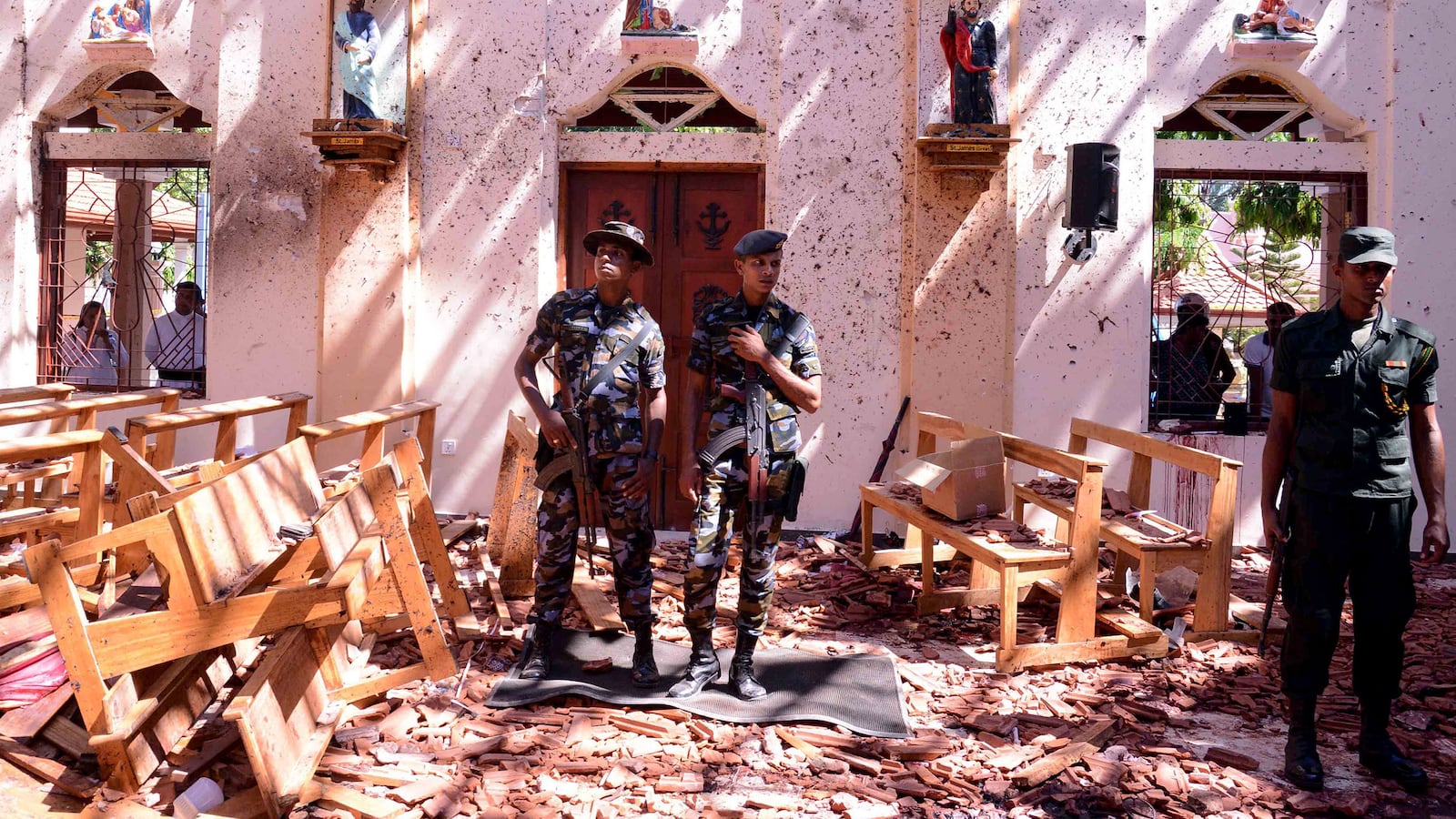This analysis updated 1t 10:15 a.m. EDT, April 22, 2019.
NEW YORK—“It’s really a shame it had to come to this,” said an NYPD counterterrorism officer who was posted Sunday morning outside a Catholic church on Manhattan’s Upper East Side. Inside, the pews were filled with the faithful at Easter mass.
I asked her if she and her colleague were there because hundreds of people were killed hours earlier, halfway around the world, at Easter services in Sri Lanka. No, she said, this deployment in New York was scheduled months ago, but she understood the question perfectly well.
Christian churches, along with Jewish synagogues, Buddhist shrines, and Shiite Muslim mosques have been prime targets for violent jihadists, whether from the so-called Islamic State, al Qaeda, or groups or individuals that most of the world has never heard of.
The terrorists are on the fringe of their own faith, claiming anyone who does not believe exactly as they do deserves to die in their “holy war” against “Crusaders” and Jews, infidels and apostates. So wide do they cast their net of hatred that they can justify killing almost anyone, and the softer the target, in many respects, the better.
Especially from the perspective of ISIS and those it inspires, places of worship have the advantage of great symbolism and virtually no defenses. And an attack in one part of the world can lead to attacks elsewhere. If the death toll is high enough—which is certainly the case with the coordinated bombings in Sri Lanka—the shock will reverberate around the globe.
Notwithstanding the boasting of President Donald Trump, the war waged by such terrorists is far from over, and that is well understood by anyone in counterterror ops, which is why police would have been stationed outside places of worship in New York City anyway. Such are the facts of life and death in the 21st century.
“Happy Easter,” said the policewoman on the Upper East Side.
The killers in Sri Lanka attacked five-star hotels as well as churches, killing at least 290 people and wounding many hundreds. Several Americans are believed to be among the dead and injured. And while the question of what group, exactly, is behind the bombings remains unclear, the timing, the context, and news reports that Sri Lankan security warned of imminent jihadist attacks on churches, strongly suggest the slaughter was the work of Muslim extremists.
The French news agency AFP reported that Sri Lankan Police Chief Pujuth Jayasundara issued an intelligence alert to top officers 10 days earlier, warning that suicide bombers planned to hit "prominent churches."
According to the report, the alert said, "A foreign intelligence agency has reported that the NTJ [National Thowheeth Jama'ath] is planning to carry out suicide attacks targeting prominent churches as well as the Indian high commission in Colombo."
On Monday, after arresting dozens of people, the Sri Lankan government continued to focus attention on the NTJ and apologized for its abject failure to act on the earlier warning. Initial investigations suggest all the suicide bombers were locals. But foreign involvement is suspected as well.
The NTJ was accused of vandalizing Buddhist statues last year, but has never carried out any terrorist acts remotely as murderous and sophisticated as the coordinated bombings on Sunday. It does not figure on the State Department’s list of major terrorist organizations.
Sri Lanka also has a long history of violence by the former separatist organization Liberation Tigers of Tamil Eelam (LTTE), which was not a Muslim organization at all, but whose “Black Tigers” were some of the first and most effective suicide bombers on the world scene. One of them successfully murdered former Indian Prime Minister Rajiv Gandhi in 1991. The LTTE finally was crushed by Sri Lankan government forces in 2009.
Rita Katz, director of the SITE Intelligence Group, which closely monitors jihadist chat and communiques, noted Sunday in an extended thread on Twitter that ISIS supporters were quick to celebrate the Sri Lanka attacks as revenge for the military campaign that finally ended its open control of territory in Iraq and Syria, and for the massacre at mosques in Christchurch, New Zealand, last month.
CNN's Barbara Starr reported Monday that according to a U.S. official "initial intelligence are that the group responsible for the attacks in Sri Lanka was inspired by ISIS."
The extent of coordination and the materiel for the bombings that has been discovered, including multiple detonators, also suggests foreign involvement. But the Tamil Tiger history shows the expertise for building suicide bombs is well established on the island.
Katz noted that no organization has claimed the operation, there have been fighters from Sri Lanka mentioned in ISIS ranks, and Sri Lanka in any case would be “easily accessible” for its supporters in the region. Southeast Asia, particularly the Philippines and Indonesia, have “seen a surge of central-coordinated ISIS activity” in what it dubs its “East Asia Province.”
“Furthermore,” Katz wrote, “today’s bombings, albeit far more deadly, mirror January 2019 bombings” that targeted a Catholic Church in the Philippines, which ISIS formally claimed. She suggested that ISIS channels, “posting rampantly” about Sri Lanka, were paving the way for the organization to claim responsibility. Katz said that while the Easter Sunday slaughter may be framed as revenge for the New Zealand atrocity committed by a radical white nationalist, it was most likely planned long before.
Of course claims do not necessarily reflect reality, and in any case need to be studied carefully. A group aligned with ISIS, the Noor al-Tawhid Foundation, claimed the fire that ravaged the cathedral of Notre Dame in Paris last Monday was not the work of jihadists, who had nothing to do with the tragic accidental blaze, but was the work of Allah: “divine punishment” for destruction of the mosque in Baghuz, the last ISIS redoubt to fall in Syria.
Extremists believe what they want to believe, always drawing inspiration from their own supposed victimization, and calling for “revenge” against those they hope to slaughter. Whoever finally is held responsible for the murders in Sri Lanka, and several arrests reportedly have been made, there is little question the group will claim it had no choice, and that will be the word spread to followers and faithful around the world, inspiring new attacks that may come much closer to home. ... It’s really a shame it has come to this.







